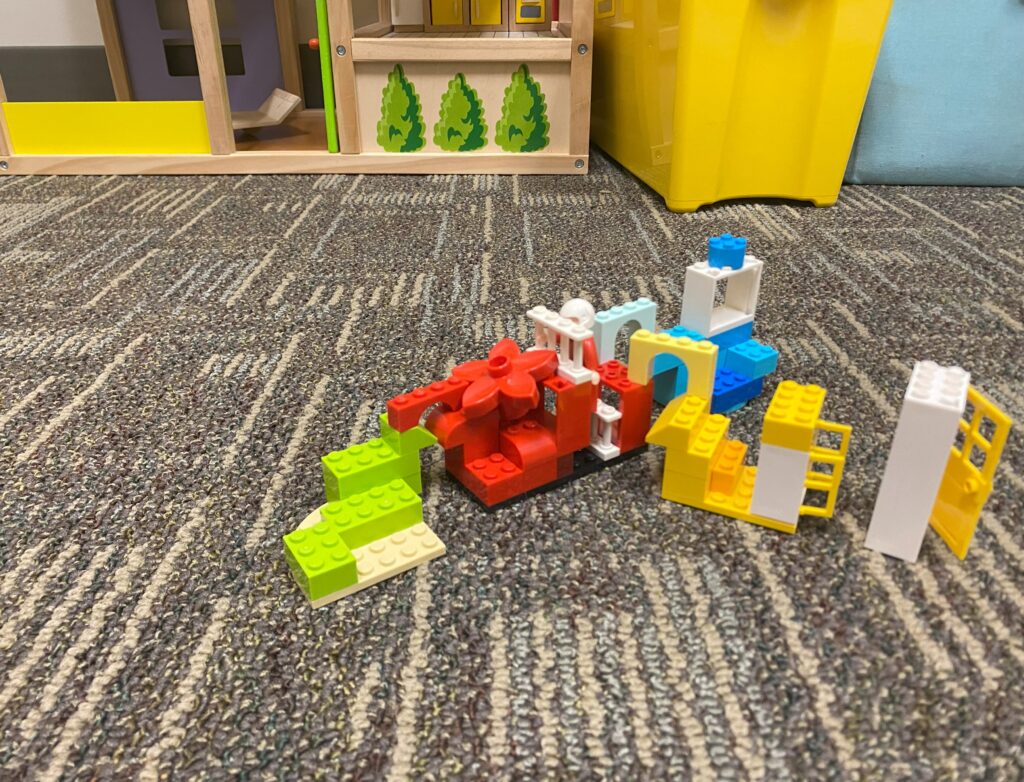LEGOs: A Powerful Tool to Use in Therapy
Written by Sierra Lauber, PhD, Postdoctoral Psychologist
 LEGOs are not only a popular household toy that spans generations but can also be a powerful tool to use in therapy with children, teens, and even families. Their familiarity makes them appealing and accessible to most children, especially those who may be hesitant about therapy or struggle to verbally express themselves. They can also be a great opportunity for teamwork and shared problem solving in family or group therapy. It offers a welcoming, non-threatening way to support connection and communication. These qualities make LEGOs a valuable, versatile resource for creating a welcoming therapeutic environment where we can work toward therapy goals in a playful and fun manner.
LEGOs are not only a popular household toy that spans generations but can also be a powerful tool to use in therapy with children, teens, and even families. Their familiarity makes them appealing and accessible to most children, especially those who may be hesitant about therapy or struggle to verbally express themselves. They can also be a great opportunity for teamwork and shared problem solving in family or group therapy. It offers a welcoming, non-threatening way to support connection and communication. These qualities make LEGOs a valuable, versatile resource for creating a welcoming therapeutic environment where we can work toward therapy goals in a playful and fun manner.
One of my favorite reasons to keep LEGOs on hand in my office is due to their adaptability across contexts and therapy objectives. Some ways I’ve used these include:
- Emotion exploration, such as creating an emotion island
- Using colored LEGO pieces, clients can assign an emotion to a color and build an island to represent how frequently they experience that emotion.
- We can use a playful approach to exploring how they (or their Lego minifigure) travel to different parts of the island (i.e., noticing when and how their emotions change).
- Group therapy
- Helps add a balanced structure to communication and peer interactions, which decreases anxiety for kids while still promoting teamwork and communication.
- For example, creating a world with group members and a together being presented with “a problem” they need to work together to solve.
- Family therapy
- Because LEGOs are often beloved across generations, and even include models aimed for adults, LEGOs can be an excellent way to incorporate play in a manner that is inviting and comfortable for all family members.
- Especially beneficial for exploring communication styles. For instance, one family member sits back-to-back with another and acts as the describer, building a small structure and giving instructions. The follower replicates the structure based solely on these directions, without seeing what the describer is doing.
- The activity highlights strengths and challenges in communication, following directions, and perspective taking, all in an enjoyable and engaging way that is accessible to children.
LEGOs are an excellent tool for integrating a collaborative and creative approach to supporting children and families’ treatment goals. It helps kids have a greater sense of autonomy in their therapy process and provides opportunities for kids to engage in self-reflection in a manner that is often seen as less intimidating. I continue to be amazed at the creative ways my clients use LEGOs to process their narrative or current challenges and am grateful to be a small part of that journey.
So, the next time you painfully step on one of those sharp-edged bricks that didn’t get picked up at home, think of the ways LEGOs can be used therapeutically and maybe it will hurt just a little less.
In all seriousness though, LEGOs can be an exceptional way to connect with kids, both in therapy and at home. They offer a way to play and create that is away from screens and not constrained by cold weather. If your child already enjoys LEGOs, consider joining them to see what kind of world you can create together.
This image is an example using LEGOs to make an emotion island, as well as processing where and when they feel “stuck” in an emotion. (This is not an actual client example).


 Oliver is a thoughtful, curious first grader. With a backpack full of school supplies and a renewed sense of resilience, Oliver is classroom ready. But last year was different. He grew uninterested and aggressive. One day he stood in the middle of his kindergarten classroom and screamed. His worried parents knew he needed professional counseling but they worked multiple jobs and relied on public transit. It seemed impossible to find a qualified children’s counselor on a bus line, plus take unpaid time off from work.
Oliver is a thoughtful, curious first grader. With a backpack full of school supplies and a renewed sense of resilience, Oliver is classroom ready. But last year was different. He grew uninterested and aggressive. One day he stood in the middle of his kindergarten classroom and screamed. His worried parents knew he needed professional counseling but they worked multiple jobs and relied on public transit. It seemed impossible to find a qualified children’s counselor on a bus line, plus take unpaid time off from work.



